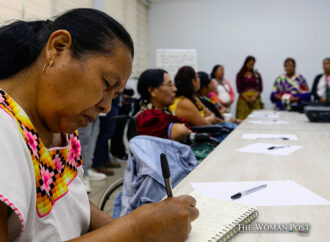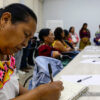On International Women's Health Day, the debts to women's integrity are made visible as a result of poverty, violence, wars, discrimination, and social exclusion.
Cardiovascular diseases, arthritis, migraines, cervical and breast cancer are some of the diseases that most affect women's health in Latin America.
According to data from the World Health Organization (WHO), although women live longer than men, with 74.2 and 69.8 years respectively, female morbidity is higher. Non-communicable diseases continue to be the leading cause of death in females, with 18.9 million female deaths in 2015. The organism emphasizes that cardiovascular diseases cause the highest number of female deaths. Cervical and breast cancer are the most common, and lung carcinoma is the leading cause of death.
Read more content like this at: thewomanpost.com
Depression and physical and sexual violence add to the list of risks to women's health. One in three women may experience physical and sexual violence at some point in their lives. Additionally, about 830 women die from preventable causes related to pregnancy and childbirth, laments the WHO.
The Situation in the Region
Therefore, on the occasion of International Women's Health Day, celebrated every May 28th, the international organization calls for awareness about women's health, common diseases, and their ailments, many of which can be prevented, especially concerning maternal mortality due to lack of healthcare, which in Latin America and the Caribbean was 68 per 100,000 live births last year, according to data from PAHO.
This global date for women's health, promoted since 1987 by the Latin American and Caribbean Women's Health Network (RSMLAC), launched a campaign to make women and girls visible in terms of their integrity as a universal right, at risk due to poverty, violence, wars, and discrimination, as well as social exclusion based on religion, race, or sexual preference.
Discrimination in Access to Healthcare Services
PAHO recently highlighted that in the Americas region, indigenous women, Afro-descendant women, Roma women, and women from other ethnic groups continue to suffer from structural discrimination, exclusion, and inequality in access to healthcare due to low coverage. They are also exposed to tuberculosis, malaria, and mental health issues, among others.
You can also read Ovarian Cancer: A Shadow over Women´s Health
The truth is that gender equality in health remains an outstanding debt. Women and men still do not have equal conditions to fully exercise their rights and potential to be healthy, contribute to health development, and benefit from outcomes. "Gender equity means a fair distribution of benefits, power, resources, and responsibilities between women and men," clarifies Pan American Health Organization (PAHO).
The organization pointed out that there are gender differences when reviewing women's health in terms of their needs, access, and control of resources. Therefore, the call is for health systems to address these differences with specific measures that eliminate gender inequities.
"When addressing gender and health issues, the differences between women and between men should be taken into account regarding age, socioeconomic status, education, ethnic group, culture, sexual orientation, disability, and geographical location," states PAHO in its guiding principles for health policies in the countries of the Americas.
Gender perspective in access to health is defined as "the process of assessing the consequences that any planned action, including legislation, policies, and programs, has on men and women, in any sector and at all levels. It is a strategy to make women's and men's issues and experiences an integral dimension of the design, implementation, monitoring, and evaluation of policies and programs in all political, economic, and social spheres, in a way that does not perpetuate inequality. The ultimate goal is to achieve gender equality," clarifies the regional international health organization.

























Leave a Comment
Your email address will not be published. Required fields are marked with *